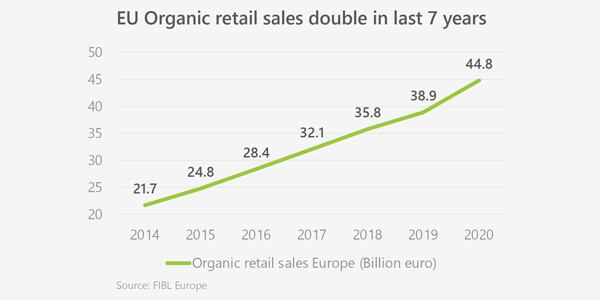The world is willing to make great strides on the path to organic food. But the journey is not an easy one. Caught up in the cycle of demand and supply, organic food production is certainly under the spotlight and drawing attention like never before.
Our food system is already undergoing radical change. It is shifting towards a more future-proof organic and regenerative food model. Concerns around health, ethics, and the environment are making more consumers opt for organic food. Driven by these consumers’ concerns, as well as governmental regulations and their own sustainability goals, food manufacturers are actively contributing to meeting the SDGs by, for example, cutting down their carbon footprint.
Embedded in the wider network of the organic food industry, Bunge has been steadily growing sustainable supply chains for organic lipids, fostering co-creation and promoting transparency. With the active participation and contribution of various stakeholders, they are committed to strengthen the organic supply chain end-to-end, from farm to fork.
Reducing impact on climate
Currently, the agriculture industry accounts for around 23% of the global greenhouse gas emissions.1 The industry thus has an important role to play in mitigating climate change. Regenerative agriculture has been gaining attention in recent years because of its potential to reduce impact on the climate while transforming our food system. For instance, healthy soils from regenerated lands are estimated to capture about 2Mt of carbon per hectare.
Like regenerative agriculture, organic farming shares the goal of promoting the overall sustainability of the ecosystem. It is a certified system that ensures the entire supply chain complies with organic regulations. While the specific practices may vary, it is an effective step towards the regenerative model. The steady growth of the organic market has reflected exactly that. According to FIBL Europe, European organic retail sales have more than doubled between 2014 and 2020, rising from 21.7 billion to 44.8 billion euros.

Breaking barriers to growth
There is, however, a catch – conscious consumers are willing to choose organic products, but not at the cost of their sensory experience, and not at any price. The perceived lack of quality of some organic products, coupled with high prices, often hold them back from permanently changing their buying behaviour. Food producers who want to move to organic sourcing and production too face hurdles in their transition. While they may have the expertise in creating tasty products, new capabilities and other specific knowledge about organic food are needed to meet consumer standards. Furthermore, limited availability within the supply chain adds to the challenge. Fortunately, as with all major upheavals, challenges come hand in hand with opportunities.
Bunge has been in the industry for decades and is attuned to these shifts and is a leading agribusiness and food ingredients company. They leverage their global presence and sustainability efforts to achieve scalable, integrated organic supply chains. They develop these supply chains not only with farmers but also with all stakeholders, including fertilizer companies, food manufacturers and NGOs, thus accelerating the transition to organic and regenerative agriculture.

With in-house lipid experts, Bunge works on innovations in organic lipid solutions and food applications to co-create the best tasting organic food. Whether to pioneer products with a balanced nutritional profile for health-conscious consumers, or to create more indulgent treats, they know the importance of delivering high-quality, fully traceable organic lipid ingredients to their customers.
Now, more than ever, the food industry is in need of a transformation. The changing climate is calling for urgent actions, and consumers’ needs and trends are evolving to challenge the status quo of our supply chains. Bunge is leveraging organic and regenerative principles to gather momentum for the much-needed overhaul. From farm to fork, they are breaking the barriers to growth and co-creating with farmers, manufacturers, and other stakeholders to reimagine the future of organic food.
References
1. IPCC. Climate Change and Land: Summary for Policymakers Intergovernmental Panel on Climate Change (2020).




